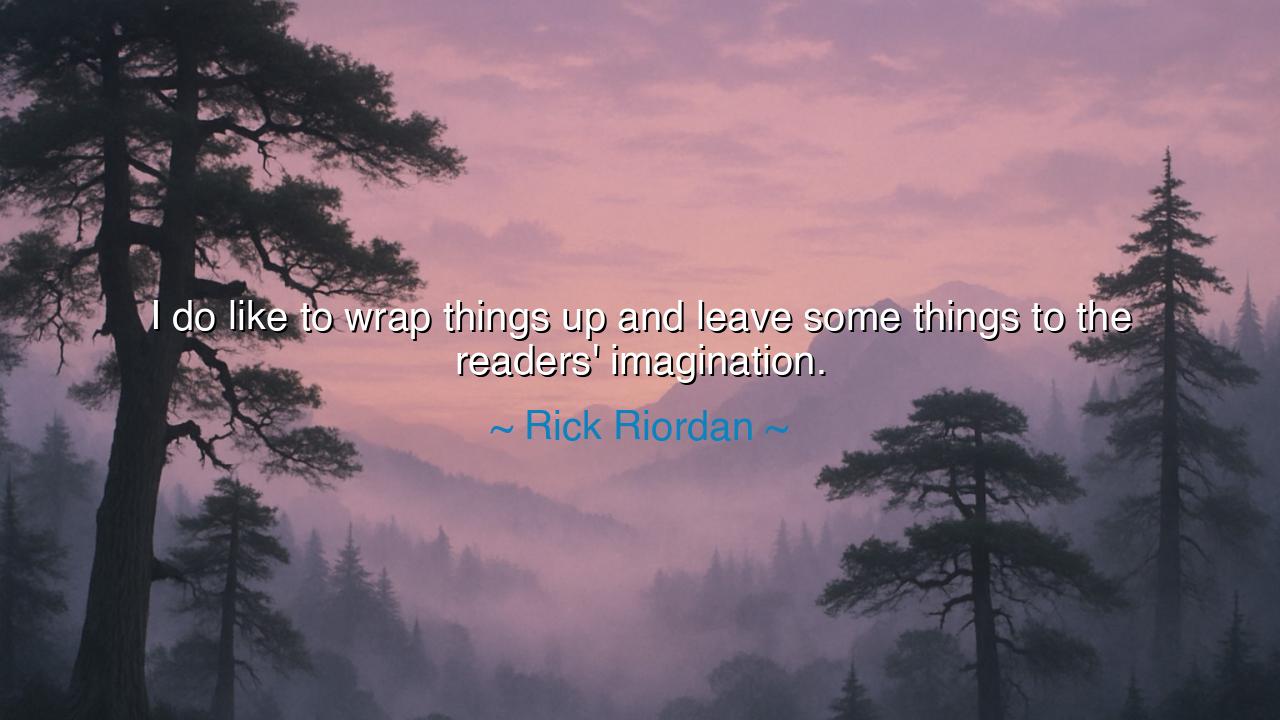
I do like to wrap things up and leave some things to the readers'






The Sacred Space Between Words: The Power of the Reader’s Imagination
Hear now, O seeker of stories and wisdom, the words of Rick Riordan, the storyteller of heroes and gods reborn: “I do like to wrap things up and leave some things to the readers’ imagination.” These words may seem gentle, but within them lies an eternal truth about the dance between the creator and the listener, between the writer and the reader. For in every great tale, there is a moment when the storyteller must fall silent, and the imagination of the listener must awaken. The story ends, but the dream continues — carried onward in the minds and hearts of those who have heard it.
Riordan, who brought myth to life for a new generation through his tales of demigods and destiny, speaks here of a sacred balance. To “wrap things up” is to bring order to the story, to fulfill the promise of its beginning. Yet to “leave some things to the reader’s imagination” is to honor the listener’s freedom to dream. It is the humility of the true artist — to know that creation is not complete when the pen is lifted, but when the mind of the reader joins the act of creation. The best stories are not prisons for meaning; they are open doors through which imagination may pass.
From the dawn of time, the storytellers of the ancient world understood this truth. The bards of Greece, the poets of the East, the singers of the North — they never told everything. They left space for wonder, for fear, for longing. The old myths ended with riddles and mysteries, not because the tellers lacked answers, but because they knew that mystery nourishes imagination. When Homer spoke of Odysseus returning home, he did not tell us every word the hero spoke to his wife, Penelope — he let the silence speak, for in that silence lives the reader’s own yearning and completion.
So too, in the hands of Riordan, imagination becomes the bridge between author and audience. His worlds of gods and monsters do not bind the reader; they invite the reader to become a co-creator. We imagine the heroes’ futures, their joys and sorrows, their unseen journeys beyond the page. This act — of leaving space for imagination — transforms passive reading into participation. The young reader, awakened by curiosity, becomes an artist in their own right. Thus, the tale outlives its teller, renewed in every generation through the imaginative spark it awakens in others.
Consider also the wisdom of Leonardo da Vinci, who once left some of his paintings unfinished — not from laziness, but from reverence for mystery. He said that “art is never finished, only abandoned.” This is what Riordan echoes: that a story too complete becomes lifeless, but one that leaves room for the imagination continues to breathe. The mind yearns not only for answers but for wonder, and the greatest artists — whether painters, poets, or storytellers — understand that what is unsaid can speak more loudly than what is declared.
This teaching reaches beyond art into the very way we live and love. In every human relationship, there are spaces we cannot fill with explanation, mysteries we cannot resolve. We must learn to leave room for imagination — for grace, for the unknown. To try to control every ending, to define every moment, is to smother life’s magic. As in storytelling, so in life: the unsaid, the unseen, and the unfinished carry the greatest power to inspire.
So, O listener, take this lesson into your heart: when you create — whether through words, deeds, or dreams — do not fear to leave space. Give others the sacred gift of participation. Let them see not only what you have built but what they may build upon it. When you speak, do not fill every silence; when you teach, do not answer every question; when you live, do not demand that every mystery be solved. For it is in imagination, not certainty, that the soul grows.
Thus, as Rick Riordan teaches, to “wrap things up” is to bring harmony, but to “leave some things to the reader’s imagination” is to grant freedom — and in that freedom, the story lives forever. For every ending that leaves space for wonder becomes not an end, but a new beginning, carried onward in the heart of the listener. The wise storyteller closes his tale with silence, knowing that in that silence, the imagination of others will rise — and the world, once again, will be remade.






AAdministratorAdministrator
Welcome, honored guests. Please leave a comment, we will respond soon